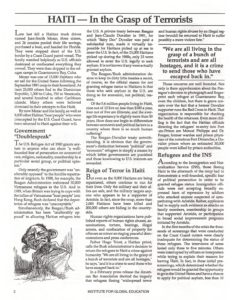

By Gerard Akkerhuis
During the 40 years at the Institute for Global Education, there have been several campaigns to educate the community and facilitate political change for the island nation of Haiti. There were initiatives to confront corporate globalization, U.S. interference in the nation’s government, so called “free trade” agreements, and the threat of war. Our answer to these global issues is to facilitate democratic and peaceful processes, negotiation, and “fair trade”.
After a review of the history of Haiti up to current events and a report of IGE’s past work regarding Haiti, there is an introduction to a new non-profit, Figi Jézi, that is now working in Grand Rapids and Haiti, administered by my cousins, Telsaint and Amanda Morisset.
History of Haiti
In the Caribbean, the island of Hispaniola is divided between the nations of the Republic of Haiti and the Dominican Republic.
“Approximately 95% of the population of Haiti is Black Creole. Within Black Haitians, 86% are Black African, 12% are Black European, and 2% are Native American. The remaining population of Haiti is primarily composed of Mulattoes, Europeans, Asians, and Arabs. Hispanic residents in Haiti are mostly Cuban and Dominican. About two-thirds of Haitian people live in rural areas.” (Demographics of Haiti, from Wikipedia)
Pre-Columbian
The indigenous Taino from the Yucatan peninsula, Mexico, whose language is Arawak, began to arrive on the island around 4000 BCE. There were later migrations of indigenous people from the region now known as Venezuela. The name Haiti is from the Arawak Ay-ti, meaning “land of mountains”. refworld: World Directory of Minorities and Indigenous Peoples – Haiti also look up Taino from Wikipedia and Hispaniola from Wikipedia.
Colonial
The slave trade of African people by European people began in the 1440’s, lasting until the latter half of the 1800’s, the largest forced migration in history. Almost half of peoples enslaved during the end of the 17th century were brought to the islands colonized by the French and the British. The nation of Haiti was founded by the world’s only successful slave rebellion, inspired by the French Revolution. In 1803, Napoleon’s army was defeated by Jean-Jaques Dessalines, an ex-slave, and his generals whereby independence from France came in 1804. In October of 1806, Dessalines was assassinated with the effect that Haiti was itself divided between a military state and a kingdom. In 1820, Haiti was reunited as a country and also incorporated Santo Domingo, then a Spanish colony. When attempts to revive the plantation economy by Jean-Pierre Boyer failed, the economy was replaced by coffee farms for exports and local agriculture for food. In 1825, France recognized Haitian independence. In 1844, the Dominicans declared independence. The next 63 years resulted in multiple governments in Haiti where racial issues were always present. The poor and illiterate Black majority hardly ever gained political power. After 1860, the church played an important role in preserving the elitist and racist European culture. The language of Haiti is Creole (Kreyol), based in French patois. But African customs and the Voodoo religion are still practiced by a majority of the Haitian people.
Modern
Heavily in debt and plagued by civil instability, Haiti was invaded by the United States in 1915, while the US planned to take control of the Caribbean to lure capitalists into the region. There was enough resistance from a nationalist movement to force the US out in 1934. However, the occupation left the mulattoes in power. Again, there were decades of political upheavals as the Black middle class and the old elites competed for political control. A succession of leaders arose and fell, notably Stenio Vincent (1930-1941), a military coup (1946), Dumarsais Estime (1946-1950), Paul Magloire (1950-1956), and Dr. Francois Duvalier “Papa Doc” (1957-1971), who was an anti-communist nationalist backed by his own terrorist militia and the US, and after his death, his son Jean-Claude “Baby Doc” (1971-1986). The son eventually became unpopular due to his elitism, forcing him into exile in 1986. After Duvaliers, there were unsuccessful military-led governments until 1990 when Jean-Bertrand Aristide, an ex-priest who promoted liberation theology and the practice of Voodoo, became the first democratically elected leader, but he was forced to flee in 1991.
“As a priest, he taught liberation theology and, as a president, he attempted to normalize Afro-Creole culture, including Vodou religion, in Haiti. President Aristide was briefly president of Haiti, until a September 1991 military coup. The coup regime collapsed in 1994 under U.S. pressure and threat of force (Operation Uphold Democracy). Aristide was then president again from 1994 to 1996 and from 2001 to 2004. However, Aristide was ousted in the 2004 coup d’état after right-wing ex-army paramilitaries invaded the country from across the Dominican border. Aristide and many others have alleged that the United States had a role in orchestrating the coup against him. Aristide was later forced into exile in the Central African Republic and South Africa. He finally returned to Haiti in 2011 after seven years in exile.” (Jean-Bertrand, Aristide from Wikipedia)
The recent political history continues to be as convoluted as before with too much information to follow here, except that the current president, Jovenel Moïse of the Haitian Tèt Kale Party, elected in 2017, is now facing political demonstration and calls for resignation due to high fuel prices
Natural Disasters
Recently, there have been significant natural events that have had a serious impact on the people of the Republic of Haiti. Since 2004, the country has been hit by a series of five very serious tropical storms and hurricanes, creating more death and destruction, increased political instability and the need for more humanitarian aid. Also, in 2010, there was a 7.0 magnitude (200 year) earthquake followed by a huge cholera outbreak leaving thousands dead, a million ill, and nearly a million homeless. The cholera came from a contaminated United Nations peacekeeping water station that infected the country’s main river, the Artibonite. (Haiti from Wikipedia, 2.3.11)
Even though there has been urban development centered on light manufacturing and assembly plants, the economy is as dependent on agriculture, with most Haitians living in the countryside. Contending with political upheaval, serious droughts and storms, human history and nature have made Haiti the poorest country in the hemisphere, where the Haitian people continue a struggle of survival. There has been a significant migration of Haitians to the US, the Dominican Republic and to the Bahamas.
Cambridge Encyclopedia of Latin America and the Caribbean, 2nd ed., Collier, Skidmore, Blakemore (eds.), Cambridge University Press, 1992, (pp. 141, 302-304, 340)
Institute for Global Education in the 1990s and 2000s
Here are several articles from our newsletter, Equity, from the 1990s and 2000s about local actions in support of the Haitian people and Fair Trade. (Come into the office for a copy!)







Figi Jézi
Figi Jézi, (“Face of Jesus” in Creole), a Grand Rapids based non-profit organization serving Haitian orphans and needy widows and their children, while promoting community growth and fellowship. was founded in 2014 by Telsaint Morisset and his wife Amanda. They relocated to Ville du Cap-Haitien, Haiti, to oversee the mission and initiate all future projects.
Telsaint is a Haitian native that left on a boat of 350 people after a military coup ousted the country’s president. He was brought by the Coast Guard to Guantanamo Bay in Cuba and, by the grace of God, was accepted as a refugee through Bethany Christian services refugee program where he was welcomed into a wonderful Christ centered foster family and later met his wife Amanda and started a beautiful family here in Michigan.
Amanda is a Registered Nurse working for a local Grand Rapids, MI (UOM) hospital that had quickly fallen for the absolute resilience of the Haitian people after the devastating earthquake in 2010. She has since made it her personal mission to serve Haiti in any way that God will allow.
Figi Jézi has several projects that will be tackled head on to fulfill the mission of improving the lives of Haitian’s affected by extreme poverty, neglect, lack of resources, and fear.
They most recently successfully raised the funds for property in the country’s Northern region of Cap Haitian to start doing community outreach projects. Recently, they received a shipping container that will become a health clinic.





The center of their mission is a high quality Children’s Home, equipped to take on twenty-four orphaned/abandoned children, as well as six caregivers, a family style dining area, a nurse’s station, and two large school rooms for future use all centered around an outdoor courtyard.
By hiring local widows and widowers to care for the children and do grounds work, Figi Jézi will provide devastated families the ability to provide for themselves.
Figi Jézi will provide a sanctuary for the community to gather together in worship and prayer. They desire to seek out and train Hatian children to be its future leaders.
An estimated 54% of the women and girls, and only 48% of the men and boys in Haiti have received any type of education. Figi Jézi will house, on location, schooling for the needy children and free to low-cost education for the children of its employees.
Equipping children with tools for employment is a necessary step towards long-term sustainability. They will be taught trades according to their strengths and the community needs in order to provide a living for themselves.
Business and ministry opportunities will be provided according to the trades learned for children aging out of the system. This provides opportunity to live independently, incorporates funds back into the organization, and provides needed resources for the community as well.
Along with various medical mission groups, the Center will host the Tommy Hamlin Medical Center which will provide regular check-ups for the orphans. This allows the growth of each individual child to be assessed and documented for easy tracking. Any deficiencies will be addressed and closely monitored by trained medical staff.
In attempts to reach out to the neighboring community, Figi Jézi will host various events. Events will include but are not limited to, vacation bible school, community clean-up days, movie and popcorn nights, picnics, soccer tournaments, medical clinics, and clean water distribution, etc.
The orphanage and schooling unit has been designed appropriately to incorporate an additional level in the future doubling the number of children served. Once the organization has become self-sustaining, Figi Jézi hopes for the opportunity to replicate the mission in different locations using the same model and organizational unit.
Please consider donating to this worthy cause or volunteering for service work with Figi Jézi at their site in Ville du Cap-Haitien, Haiti.
Future actions for IGE
With our ability to share information instantly around the world, the murder of George Floyd has sparked a world wide movement of Black Lives Matter. George Floyd’s murder has spoken to all of us, revealing injustice and inequity in all our institutions. Reparations has become a rallying cry for peoples still suffering from centuries of oppression, here in the U.S. and abroad. The history and present conditions of the Haitian people demand awareness and action. Since the 2000s, there have been calls for reparations from France for the enslavement, colonization, and underdevelopment of Haiti. The U.S. is also culpable due to military and economic interventions and exploitation. At IGE, we can join with the many others who need to see change in our national and foreign policies. Here is a copy of a thoughtful essay by Bill Fletcher, Jr. of the Democratic Socialists of America in the “Democratic Left”, Summer 2020. https://democraticleft.dsausa.org/issues/
Reparations: not just for descendants: System-wide legal shackles didn’t end with slavery.
There are two debates about reparations for African Americans: whether it is a legitimate demand, and who should be eligible. This latter argument has been tinged with African American nativism and, ironically, has drawn the support of some white, rightwing populists. Reparations is a legitimate domestic and international demand for compensation and repair for the damages associated with slavery, genocide, and colonialism. I would go further and argue that it is a legitimate demand in response to the horrors committed by the United States overseas since its foundation. That said, there is the specific question of reparations for African Americans. Some argue that reparations for African Americans should be reserved for those who can trace a direct line to slavery. All others who fall within the rubric of “Black America” are to be excluded. The argument for reparations for slavery is a sound one. The theft of millions in order to build capitalism needs little clarification. The challenge in the reparations debate, however, is not so much when the “clock” starts, but, rather, when does it stop. Africans were brought to the Western Hemisphere in chains in the 1500s. Though there were some Moors from Spain who came voluntarily, the overwhelming majority were brought as slaves to what we now know as Latin America. Africans who were captured and brought to North America came as both indentured servants and as slaves. As part of the instituting of social control over the laboring classes of the 13 British colonies, the British elite implemented the construction of “race” and racist oppression, which included instituting slavery-for-life for those who had African blood. Formal slavery in the United States can be said to have ended in 1865 with the defeat of the Confederacy in the U.S. Civil War. For some proponents of reparations, the story apparently ends there. The argument is that only the victims of U.S. slavery should receive compensation. There are problems with this line of thought. 1) How much blood? What proportion of one’s “blood” needs to be derived from the period of 1619: 1865? 50%? 80%? 15%? Any determination becomes exceedingly subjective. And what does it mean to have been raised with a “Black identity”? What if someone was raised in a family that passed for white but then one realized that one was African-descendant? 2) Why 1865? Yes, slavery ended in 1865, at least formally. But racist and national oppression of African Americans did not. The Reconstruction period was followed by what W.E.B. Du Bois called the “counter-revolution of property,” with which Jim Crow segregation was associated. This was a period of intense oppression and the super-exploitation of the African American worker. Why would the “clock” time out in 1865? 3) Who is “Black America”? Even if one leaves aside post-1965 African immigration to the United States, African Americans, as a people, have multiple sources, including Cape Verdeans (who began to arrive in the 19th century); African descendants of slavery imposed by the British in North America; African Caribbean descendants who began migrating to the United States in the first decade of the 20th century; and African descendants from Latin America, who began arriving with the end of the U.S. war against Mexico (1848). If one restricts the defi of African American—and, therefore, those who can receive reparations—to those who can trace their lineage to slavery, that means that Malcolm X’s family is called into question because his mother was from Grenada. 4) Individual, or collective? All this assumes a “check” made out to individuals, rather than collective reparations. Foreclosing the idea of collective reparations means dismissing the need for the reorganization of the United States and the introduction of dramatic changes in the social, political, and economic conditions faced by people of African descent. Even if the proper calculation can be made regarding what individuals who can trace some of their lineage back to the plantation are entitled to, would receiving that check mean that white capitalist America was off the hook? Is that the vision we have been fighting for? The debate continues. And the stakes are high.
DSA member Bill Fletcher, Jr., is the executive editor of globalafricanworker.com, past president of TransAfrica Forum, and a long-time leftist trade unionist.
Here are links to two more articles about reparations:
The Case for Haitian Reparations – Jacobin Magazine
Colonialism Reparation/ Haiti-France
And please:
Support the Grand Rapids African American Museum and Archives
